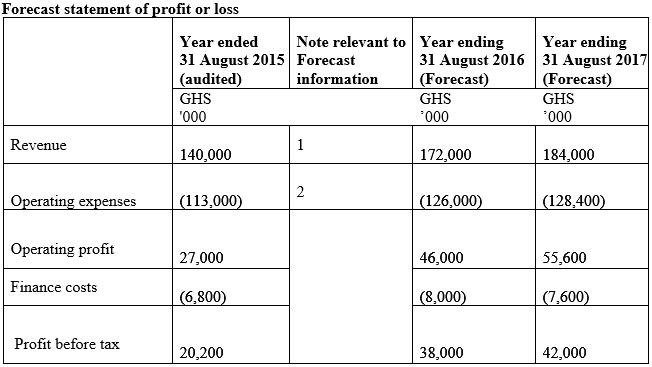May 2016 Q1 b.
Dibidibi & Co., an audit and assurance firm, has been engaged as auditors for the BCG Bank Ltd, a public limited liability company for some time now. BCG Bank has sixty branches throughout the country and branches in Togo, Burkina Faso and Cote d’Ivoire. The Bank is one of the Banks in the country which can boast of large landed properties. Dibidibi & Co. receives about 20% of its income from this particular client. Before last year’s audit, the bank engaged the audit firm to value its Land and Buildings in all its branches and headquarters. This work was executed by the audit firm and a report has been issued to management. The report has been incorporated in this year’s financial statements to be audited soon. Dibidibi & Co. sees BCG Bank Ltd. as a very important client whose works are always executed with dispatch.
Required:
i) Identify and evaluate the significance of any threats to the Code of Ethics for Professional Accountants raised in the case. (4 marks)
View Solution
As the audit firm receives about 20% of its income from just one audit client, there is a self-interest or intimidation threat. This is because the firm will be concerned about losing the client.
The self-interest and intimidation threats are significant considering the nature and duration of the breach – that is the high percentage of income from a single client received for some time now; and the knowledge of the audit firm of such interest.
Secondly, the valuation services provided by the audit firm. If an audit firm performs a valuation which will be included in financial statements audited by that firm, a self-review threat arises. This threat is significant as the valuation of Land and Buildings of all branches of the bank including the head office is material to the financial statement to be audited.
ii) Recommend safeguards to eliminate the threats (mentioned in (i) above) or reduce them to an acceptable level. (6 marks)
View Solution
- Reducing the dependence on the client
- Implementing external quality control reviews; or
- Consulting a third party, such as a professional regulatory body or a professional accountant, on key audit judgments.
- Internal quality control reviews.
As the bank is a public interest entity and the firm’s total fees has been that high for two consecutive years, the Code of Ethics provides that the firm shall:
- Disclose this to those charged with governance;
- Conduct a review, either by an external professional accountant or by a regulatory body.
Since the total fees significantly exceed 15%, a pre-issuance review shall be required. That is a review before the audit opinion on the second year’s financial statements.
The safeguards for the self-review threat from the valuation services will include:
- Second partner review
- Confirming that the client understands the valuation and the assumptions used
- Ensuring that the client acknowledges responsibility for the valuation
- Using separate personnel for the valuation and the audit.


